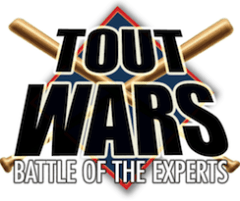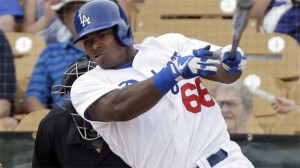THE WHAT
Peter Kreutzer trades Cliff Lee to Tristan Cockcroft
Tristan Cockcroft trades Jay Bruce to Peter Kreutzer
THE WHY
I (Kreutzer) drafted a team of starting pitching, with Lee, Greinke, Minor and Lynn. I bought hitters but made a fatal gaffe paying $8 for Dee Gordon. His subsequent demotion left a sizeable hole in the lineup, one exacerbated by an early injury to Ryan Zimmerman and a more recent one to Angel Pagan. Plus, until Ryan Sweeney’s recent explosion, none of the flyers I added on draft day or on waivers have paid off on offense. This is a team that needed another big hitter.
Cockcroft, the league’s 2012 winner, has a commanding lead in HR and RBI thanks to explosive seasons from Paul Goldschmidt and Carlos Gomez, but despite excellent ERA and WHIP it is middle of the pack in Wins and Strikeouts. Adding an elite pitcher should bring up both cats.
WHAT HAPPENED
I was trying to figure out how to make a trade with some of the teams that are strong in hitting but weak in pitching, when Tristan sent out a note to the league offering a hitter for a pitcher. I offered him Lee for Bruce (better for me than anything else I could find) or Lynn for Howard (lesser impact, lesser risk). I contemplated offering the troubled Greinke for the troubled BJ Upton, but felt Greinke was too big a price to pay to take on the Upton risk (even though Greinke carries similar risk). Call that handicapping.
Tristan got back to me after a bit, saying he’d do Bruce for Lee, but would add his Pettibon for my Matt Adams if I wanted to mitigate the pitching hit some. I did not, I’m looking for offense and if a spot opened in St. Louis Adams could be a big help, so we went with the simple one for one deal.
ANALYSIS
My hope is that my recent acquisition of Roy Oswalt and the rejuvenation of Chris Capuano, plus my sizeable (six over third place) cushion in Wins, means that giving up Lee doesn’t cost me too many qualitative and K points. The return of a healthy Marco Estrada would help here, too, I dream. Meanwhile, Jay Bruce should gain me a few points in HR and a couple more in RBI, and more importantly get me into position where another hitting add via FAAB or reserves might make a big difference (and a handful more points). As it stands right now, I have the most FAAB money.
Deducting Bruce’s stats from Tristan’s HR and RBI totals would cost him one point total at this point (though some more in Runs), so giving him up is almost like free money. He was nine wins and eight strikeouts behind me in pitching, however, so I’m going to lose there, but Tristan was sure to make a trade with someone, so those points were likely gone anyway.
The bottom line, we both shore up a weakness and balance our teams a bit. I have more upside and downside at this point. while Tristen secures his position in first place and should be much harder for everyone to catch.


